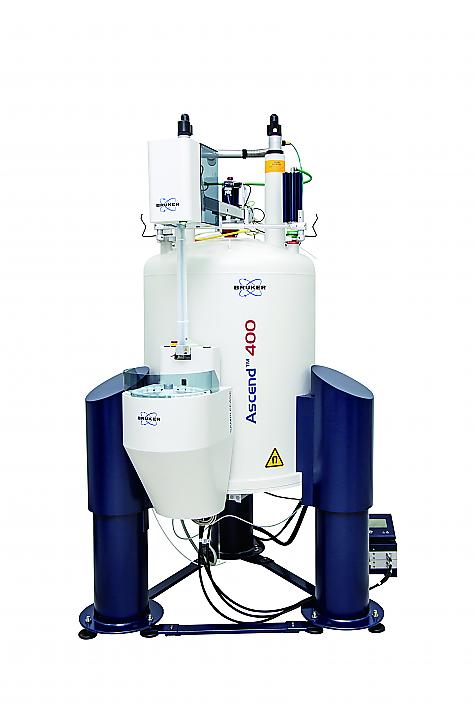400 MHz FT-NMR (Bruker) | 400 MHz 핵자기 공명 분광기 (Bruker)

| Laboratory/Field | |||
|---|---|---|---|
| Model | AVANCE III HD | ||
| Maker | Bruker | ||
| Technician | Sun-Phil Han | ||
| Contact | 052-217-4174 / okno1234@unist.ac.kr | ||
| Status for Reservation | 가능 | ||
| Reservation Unit | 10min | Maximum Time (per day) | 12hr |
| Open(~ago) | 5일전 | Cancel (~ago) | 1시간전 |
| Equipment location | 102동 B119호 | ||
-
Description
핵자기 공명 분광기는 유기분자, 고분자 물질 및 생체 분자 등의 화합물 구조를 결정하는 기기이며, 정성 및 정량 분석에 이용된다. 자기장 내에서 일정한 회전축을 갖는 원자핵에 라디오파를 가해주면 무질서하게 있던 핵들이 높은 에너지 준위로 여기된다. 이때 발생하는 원자핵의 핵자기 공명 현상을 이용하여 시료 내 핵 주위의 화학적 환경 및 이웃 원자와의 스핀 결합에 대한 정보를 얻을 수 있다.
NMR is a technique for determining the structure of most organic and some inorganic molecules. NMR studies a magnetic nucleus by aligning it with a very powerful external magnetic field and disturbing this alignment using an electromagnetic field. Different atoms within a molecule resonate at different frequencies at a given field strength.
https://ucrf.unist.ac.kr/en/category/data/technical-library/
Varian 600 MHz FT-NMR / DOSY NMR Manual / 2D NMR Manual / SOP of Bruker 400 MHz FT-NMR
https://ubts.co.kr/
NMR 이론 및 실습관련 동영상자료
NMR Theory and Practice video
(이론, 장비사용법, Mnova processing 등) -
Specifications
• 9.4 T magnet (100 MHz = 2.35T)
• 2 channel console
- Channel 1 : 1H(100%), 19F(94%)
- Channel 2 : 31P (40%) ~ 15N (10%)
• Channel 1 = 100 Watt / Channel 2 = 500 Watt
• Gradient strength = 0.05 T/m (<3*10^-11 m^2/s), DOSY
• Auto Tune & Match
• 5 mm BBO NMR Probe
• 24 Auto-sampler
• Topspin 3.5 pl7 (Windows 7)
• Temperature: RT (21 ~ 150 ˚C)
• BBO probe Tune & Match range = 31P (40%) ~ 15N (10%)
31P(40%): O
13C (25%): O
15N(10%): O
35Cl(9.7%): O
33S (7.6%): X ->Find 31P(40%) ~ 109Ag(4.65%)_Smart or i-Probe
14N(7.2%): X ->Find 31P(40%) ~ 109Ag(4.65%)_Smart or i-Probe
25Mg(6.1%): X ->Find 31P(40%) ~ 109Ag(4.65%)_Smart or i-Probe
https://kodu.ut.ee/~laurit/AK2/NMR_tables_Bruker2012.pdf
https://www.pascal-man.com/periodic-table/periodictable.shtml
• NMR solvent and Referencing (+Quantitative NMR)
1. Sample + NMR solvent (CDCl3, D2O, DMSO-D6, etc.) + reference compound
2-1. Sample + NMR solvent (CDCl3, D2O, DMSO-D6, etc.)
2-2. Reference sample
3. Coaxial sample tube (Evans method) - Reference or NMR solvent in Inner tube / Sample in Outer tube
• None NMR solvent condition -> No Lock, Autoshim -> Poor or not easy measurement!!
• Sample volume = 500ul (400 ~ 700 ul)
• Sample concentration
1. 1H: 0.05 mM ~ 10 mM (Too high concentration cause Line-broadening effect)
2. 13C, 2D NMR(COSY, NOESY, TOCSY, etc.): 10 mM ~ 100 mM
3. 15N, 17O, Hetero 2D NMR (HSQC, HMBC, HMQC, etc.): 100 mM < Highest concentration
Ex)
Sample A (MW=200), 1 mg / 500 ul = 1*2 (mg/ml) / 200 (mg/mmol) = 10 mM
Sample B (MW=500), 25 mg / 500 ul = 25*2 (mg/ml) / 500 (mg/mmol) = 100 mM
• Degassing
Oxygen (Paramagnetic) -> Short T1&T2 relaxation-> Quench NMR signal -> Purge N2 or Ar gas
• Sample tube
Wilmad(Thin wall): 527-PP-7 (Temp: O)
Wilmad(Economy): WG-1228-7 (Temp: X, only RT)
Wilmad(Cheap): WG-1000-7 (Temp: X, only RT)
https://www.bkinstruments.co.kr/Products/list.asp?page=1&s_type=&s_keyword=&p_cate=10&p_cate2=1018
-
Applications
• Structural elucidation of chemicals
• Structural determination of biomolecules (DNA, RNA, proteins, peptides, etc.)
• Study of dynamic process
• Drug design